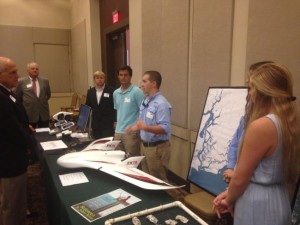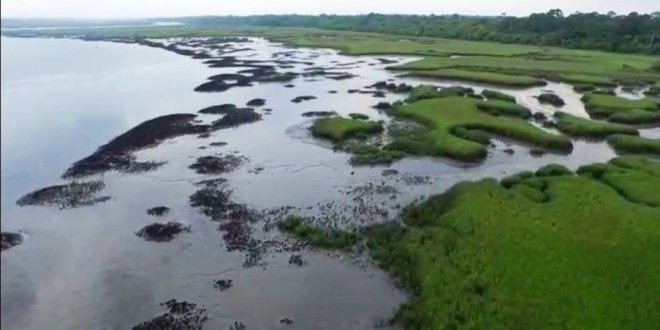With an eye toward re-opening recreational oyster harvesting in Northeast Florida, the Marine Science Research Institute, Department of Geography and the Environment, and the School of Aviation have launched a crowdfunding project with Experiment.com aimed at using drones to measure the health of local oyster beds.
It’s the first JU faculty research project on the site, following successful undertakings there by MSRI graduate student Tiffany Razo on coral reef health in San Salvador and Marine Science graduate student Danielle D’amato on maintaining a healthy Diamondback terrapin population on Georgia’s Cumberland Island. JU Director of Grant Development Renée Rossi assists with submissions, and a team of Experiment.com scientists reviews every submitted project to ensure they meet the site’s criteria.

With a campaign target of $4,300 and a few weeks left to raise funds, the project, titled “Mapping Northeast Florida Ecosystems with Unmanned Aircraft Systems,” is being guided by Assistant Professor of Aeronautics Ross Stephenson. Beginning in January, taking advantage of a graphics computer and Pix4D software that will be acquired with funds raised, students and professors from Aviation, Geography and the MSRI will partner to use the School of Aviation’s DJI Inspire 1 unmanned aircraft systems to create orthomosaic maps and 3D models of Northeast Florida oyster reefs. The maps and findings will be presented to the backers of the project as well as partners for further analysis of the rate of growth of the reefs.
Watch a video explaining the project below:
The project is part of Collaborate JU, which is a part the University’s EPIC (Entrepreneurial, Policy, Innovation, and Commerce) initiative. Projects, students and professors from multiple disciplines join forces with industry experts to solve challenging problems. Through these experiences, the students become engaged, active participants in their education and are better prepared to enter the workforce. Other Collaborate JU projects under way include Biomechanical Assessment of Athletes, Coral Reef Restoration, and Mobile Water Quality Monitoring.

As explained on the project’s Experiment.com page, harvesting oysters in Northeast Florida was halted when the monitoring stations used to assess the health of the beds were discontinued more than 15 years ago. There is growing interest in reopening the beds to commercial and recreational harvesting, and developing a cost-effective method of monitoring the health of the oyster reefs without damage to the ecosytem is vital.
“This allows database information to be collected in an efficient and environmentally friendly manner,” Stephenson writes at Experiment.com. “UAS represent a low carbon footprint solution as compared to manned aircraft … Information gathered through this research will be used to assess changes to the reefs over time and make recommendations to governmental entities about reopening the oyster beds for harvesting.”
The students presented the project to the Jacksonville Chamber of Commerce for feedback in October, and even created a 3D model of the Davis College of Business in preparation for the project. To help back the oyster bed project, click here.
 Wave Magazine Online Jacksonville University News Hub
Wave Magazine Online Jacksonville University News Hub
